北师大版(2019)必修第一册Unit1 Life Choices Writing Workshop 课件 (共27张PPT)
文档属性
| 名称 | 北师大版(2019)必修第一册Unit1 Life Choices Writing Workshop 课件 (共27张PPT) |  | |
| 格式 | pptx | ||
| 文件大小 | 3.6MB | ||
| 资源类型 | 教案 | ||
| 版本资源 | 北师大版(2019) | ||
| 科目 | 英语 | ||
| 更新时间 | 2024-07-01 10:56:07 | ||
图片预览

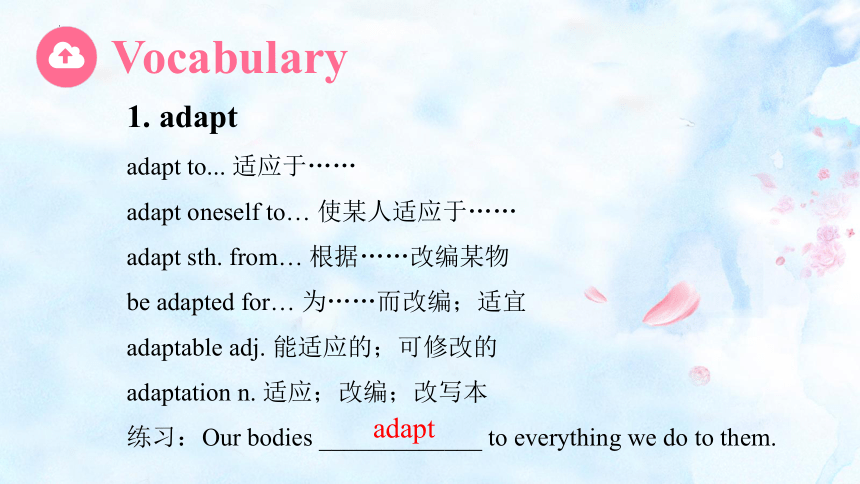
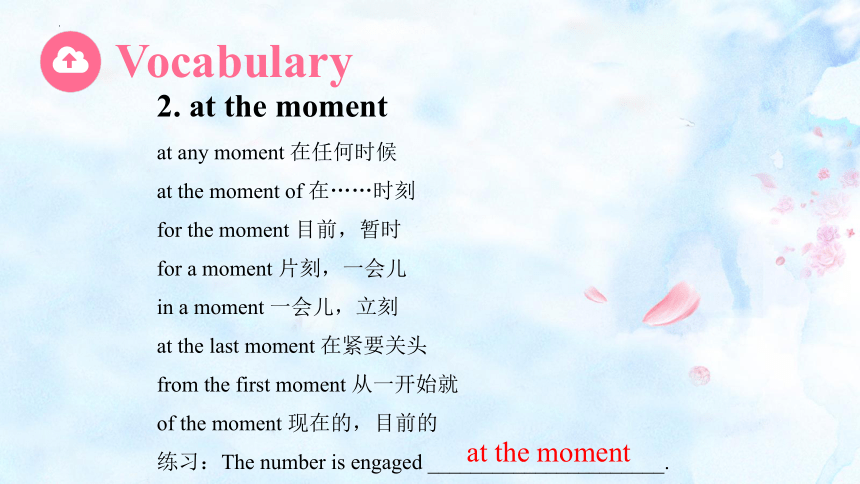
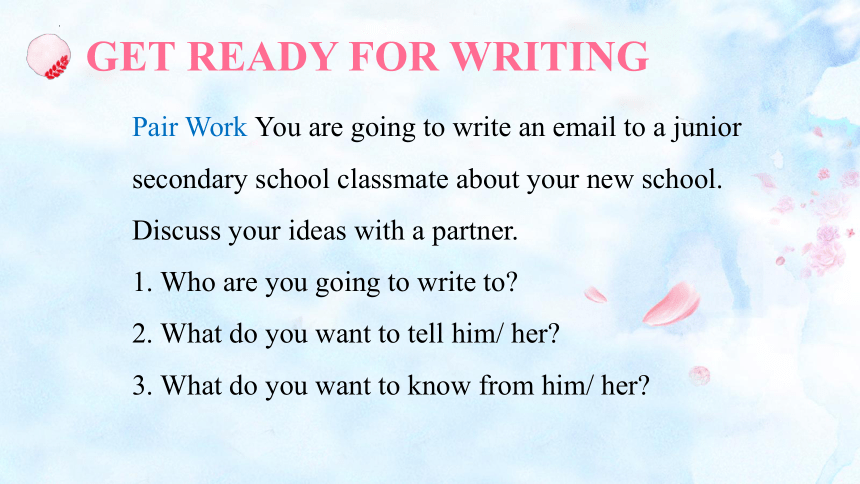
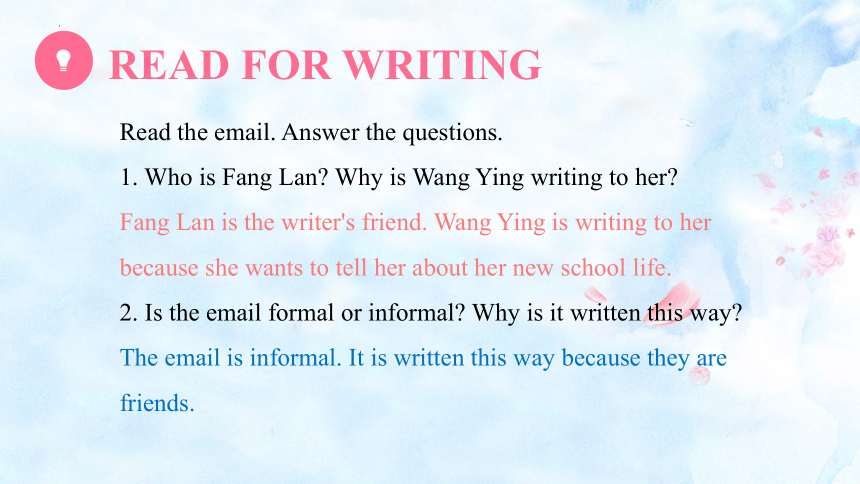
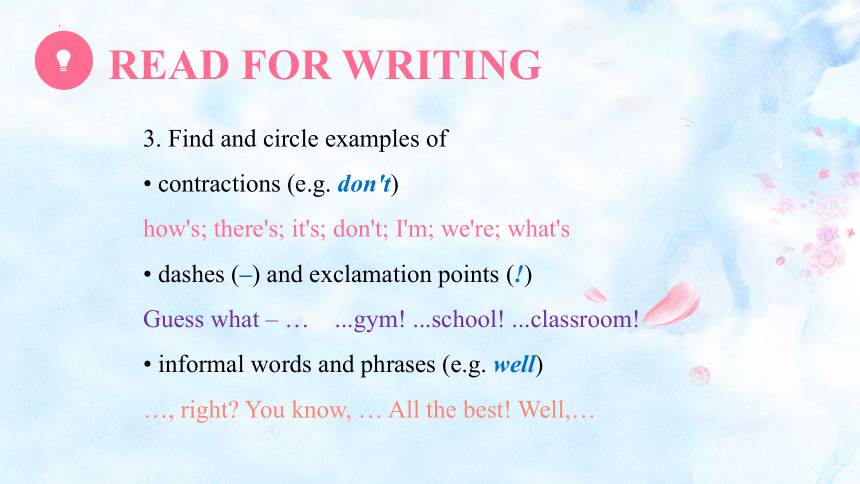
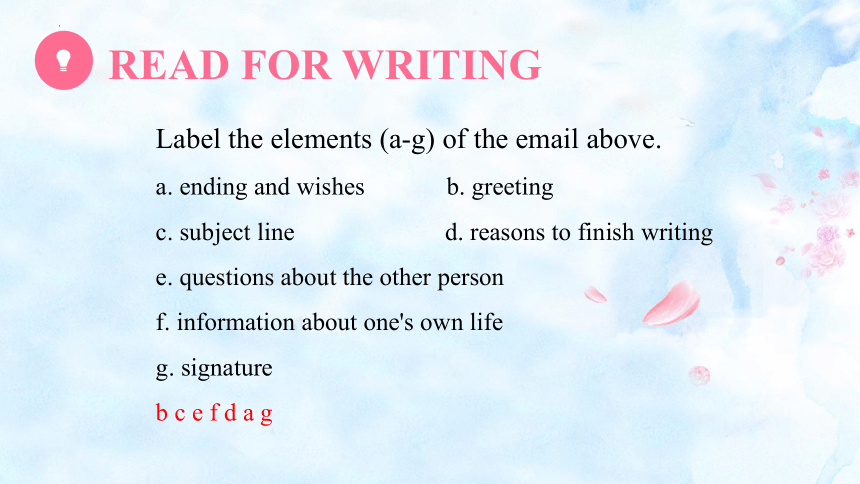
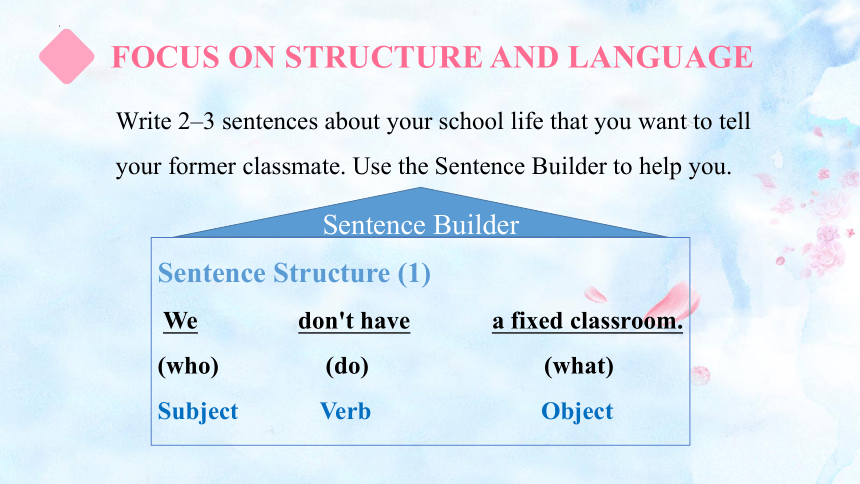
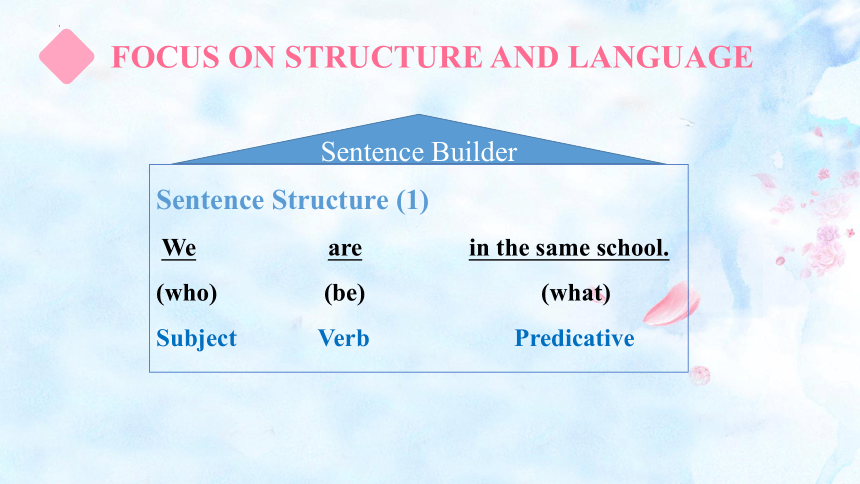
文档简介
(共27张PPT)
Unit 1 Life Choices
Writing Workshop
Vocabulary
1. adapt
adapt to... 适应于……
adapt oneself to… 使某人适应于……
adapt sth. from… 根据……改编某物
be adapted for… 为……而改编;适宜
adaptable adj. 能适应的;可修改的
adaptation n. 适应;改编;改写本
练习:Our bodies _____________ to everything we do to them.
adapt
Vocabulary
2. at the moment
at any moment 在任何时候
at the moment of 在……时刻
for the moment 目前,暂时
for a moment 片刻,一会儿
in a moment 一会儿,立刻
at the last moment 在紧要关头
from the first moment 从一开始就
of the moment 现在的,目前的
练习:The number is engaged ______________________.
at the moment
GET READY FOR WRITING
Pair Work You are going to write an email to a junior secondary school classmate about your new school. Discuss your ideas with a partner.
1. Who are you going to write to
2. What do you want to tell him/ her
3. What do you want to know from him/ her
READ FOR WRITING
Read the email. Answer the questions.
1. Who is Fang Lan Why is Wang Ying writing to her
Fang Lan is the writer's friend. Wang Ying is writing to her because she wants to tell her about her new school life.
2. Is the email formal or informal Why is it written this way
The email is informal. It is written this way because they are friends.
READ FOR WRITING
3. Find and circle examples of
contractions (e.g. don't)
how's; there's; it's; don't; I'm; we're; what's
dashes (–) and exclamation points (!)
Guess what – … ...gym! ...school! ...classroom!
informal words and phrases (e.g. well)
…, right You know, … All the best! Well,…
READ FOR WRITING
Label the elements (a-g) of the email above.
a. ending and wishes b. greeting
c. subject line d. reasons to finish writing
e. questions about the other person
f. information about one's own life
g. signature
b c e f d a g
FOCUS ON STRUCTURE AND LANGUAGE
Write 2–3 sentences about your school life that you want to tell your former classmate. Use the Sentence Builder to help you.
Sentence Structure (1)
We don't have a fixed classroom.
(who) (do) (what)
Subject Verb Object
Sentence Builder
FOCUS ON STRUCTURE AND LANGUAGE
Sentence Structure (1)
We are in the same school. (who) (be) (what)
Subject Verb Predicative
Sentence Builder
FOCUS ON STRUCTURE AND LANGUAGE
Sentence Structure (1)
We are in the same school. (who) (be) (what)
Subject Verb Predicative
Sentence Builder
FOCUS ON STRUCTURE AND LANGUAGE
Sentence Structure (1)
My new school gives me a chance.
(who) (do) (who) (what)
Subject Verb
Sentence Builder
FOCUS ON STRUCTURE AND LANGUAGE
Write 2–3 sentences about your school life that you want to tell your former classmate. Use the Sentence Builder to help you.
My new school has a huge library where I like to study. My class size is much bigger now and we move between classrooms for different subjects. I have made lots of new friends which makes me happy.
私人信件
私人信件是指亲朋好友或同事之间的来往信件。通常包括五部分,即信头、称呼、正文、结束语和签名。
1. 信头
寄信人地址和写信日期,写在右上角,地址由小到大。日期写在寄信人的地址之下,习惯上采用美式英语表达,即月、日、年,月、日与年之间用逗号隔开,月份尽量不缩写。
例如:
No.20 Nanjing Street
Beijing, 100000
China
June 2, 2020
2. 称呼
顶格,要大写,并且称呼后通常用逗号。
3. 正文
信件的主体部分即信的正文。正文写在称呼的下一行,每段起首处空4~6个字母的距离。正文通常包括三部分,即开头段、主体段和结尾段。正文的结尾是正文的一部分,常常另起一行。
4. 结束语
结束语与正文的结尾不一样,它要写在结尾的下一行,通常位于书信的右下角,首字母大写,后面用逗号。
5. 署名
写在结束语的下一行,除了对亲人或熟悉的朋友外,必须写全姓名。
注意:
英语书信的格式一般有两种:齐头式和缩进式。用齐头式写信,其正文与称呼之间空一至二行。每段的第一句不需要空格,但段与段之间需要空一至二行。齐头式信件的结束语和签名写在左下方。
COMPOSE YOUR WRITING
1. Outlining
Complete the outline of your email. Use Activity 3 to help you.
Subject line:_________________________________
Greeting: ___________________________________
Questions to ask: _____________________________
Information about you: ________________________
Reasons to finish writing: ______________________
Ending: ____________________________________
COMPOSE YOUR WRITING
Writing an Informal Email
It's important to:
· write informal emails only to someone you are close to, like your friends and family;
· use simple and informal expressions, like don't, well
Writing Help
2. Drafting
Use your outline and the Writing Help to write the first draft.
COMPOSE YOUR WRITING
Writing an Informal Email
It's important to:
· use proper email format with a subject line, a greeting, questions to ask, information to give and end with a reason appropriately;
· remember that you can use special punctuation to show your feelings.
Writing Help
COMPOSE YOUR WRITING
3. Editing
Edit your email in pairs. Then share in class.
Is it an email to a family member or close friend
Is the email written in proper email format For example, does it have a subject line, a greeting, any questions, and also information
Does it end with a reason appropriately
Does the writer use simple and informal language
Practice
假设你是晨光中学的机器人兴趣小组组长李津,你的美国朋友Chris就读于天津某国际学校,他曾在机器人技能竞赛中获奖。你打算邀请他加入你的团队,参加即将于7月底在天津举行的世界青少年机器人技能竞赛。请根据以下提示代表兴趣小组给他写一封电子邮件。
1. 比赛的时间、地点;
2. 邀请他的原因;
3. 训练计划将发送其邮箱,请他提出意见。
Practice
注意:
1. 词数不少于80;
2. 可适当加入细节,使内容充实、行文连贯;
3. 开头和结尾已给出,不计入总词数。
参考词汇:
世界青少年机器人技能竞赛 the World Adolescent Robotics Competition
Practice
Dear Chris,
I have good news to tell you. _____________________
________________________________________________________________________________________________________________________________________________
I'm looking forward to your reply.
Yours,
Li Jin
Practice
One possible version:
Dear Chris,
I have good news to tell you. The World Adolescent Robotics Competition will be held in Tianjin at the end of July. Hearing that you once took part in a robotics skills competition and won an award, I, on behalf of the Robotics Club, intend to invite you to join our team in the coming competition. I am sure that your involvement will not only help us win an award but also enhance the friendship between our schools.
Practice
With this e-mail I also send you our training plan, about which I wish to get your advice because you are more experienced than us. We sincerely hope that we can participate in the competition as team partners.
I'm looking forward to your reply.
Yours,
Li Jin
Unit 1 Life Choices
Writing Workshop
Vocabulary
1. adapt
adapt to... 适应于……
adapt oneself to… 使某人适应于……
adapt sth. from… 根据……改编某物
be adapted for… 为……而改编;适宜
adaptable adj. 能适应的;可修改的
adaptation n. 适应;改编;改写本
练习:Our bodies _____________ to everything we do to them.
adapt
Vocabulary
2. at the moment
at any moment 在任何时候
at the moment of 在……时刻
for the moment 目前,暂时
for a moment 片刻,一会儿
in a moment 一会儿,立刻
at the last moment 在紧要关头
from the first moment 从一开始就
of the moment 现在的,目前的
练习:The number is engaged ______________________.
at the moment
GET READY FOR WRITING
Pair Work You are going to write an email to a junior secondary school classmate about your new school. Discuss your ideas with a partner.
1. Who are you going to write to
2. What do you want to tell him/ her
3. What do you want to know from him/ her
READ FOR WRITING
Read the email. Answer the questions.
1. Who is Fang Lan Why is Wang Ying writing to her
Fang Lan is the writer's friend. Wang Ying is writing to her because she wants to tell her about her new school life.
2. Is the email formal or informal Why is it written this way
The email is informal. It is written this way because they are friends.
READ FOR WRITING
3. Find and circle examples of
contractions (e.g. don't)
how's; there's; it's; don't; I'm; we're; what's
dashes (–) and exclamation points (!)
Guess what – … ...gym! ...school! ...classroom!
informal words and phrases (e.g. well)
…, right You know, … All the best! Well,…
READ FOR WRITING
Label the elements (a-g) of the email above.
a. ending and wishes b. greeting
c. subject line d. reasons to finish writing
e. questions about the other person
f. information about one's own life
g. signature
b c e f d a g
FOCUS ON STRUCTURE AND LANGUAGE
Write 2–3 sentences about your school life that you want to tell your former classmate. Use the Sentence Builder to help you.
Sentence Structure (1)
We don't have a fixed classroom.
(who) (do) (what)
Subject Verb Object
Sentence Builder
FOCUS ON STRUCTURE AND LANGUAGE
Sentence Structure (1)
We are in the same school. (who) (be) (what)
Subject Verb Predicative
Sentence Builder
FOCUS ON STRUCTURE AND LANGUAGE
Sentence Structure (1)
We are in the same school. (who) (be) (what)
Subject Verb Predicative
Sentence Builder
FOCUS ON STRUCTURE AND LANGUAGE
Sentence Structure (1)
My new school gives me a chance.
(who) (do) (who) (what)
Subject Verb
Sentence Builder
FOCUS ON STRUCTURE AND LANGUAGE
Write 2–3 sentences about your school life that you want to tell your former classmate. Use the Sentence Builder to help you.
My new school has a huge library where I like to study. My class size is much bigger now and we move between classrooms for different subjects. I have made lots of new friends which makes me happy.
私人信件
私人信件是指亲朋好友或同事之间的来往信件。通常包括五部分,即信头、称呼、正文、结束语和签名。
1. 信头
寄信人地址和写信日期,写在右上角,地址由小到大。日期写在寄信人的地址之下,习惯上采用美式英语表达,即月、日、年,月、日与年之间用逗号隔开,月份尽量不缩写。
例如:
No.20 Nanjing Street
Beijing, 100000
China
June 2, 2020
2. 称呼
顶格,要大写,并且称呼后通常用逗号。
3. 正文
信件的主体部分即信的正文。正文写在称呼的下一行,每段起首处空4~6个字母的距离。正文通常包括三部分,即开头段、主体段和结尾段。正文的结尾是正文的一部分,常常另起一行。
4. 结束语
结束语与正文的结尾不一样,它要写在结尾的下一行,通常位于书信的右下角,首字母大写,后面用逗号。
5. 署名
写在结束语的下一行,除了对亲人或熟悉的朋友外,必须写全姓名。
注意:
英语书信的格式一般有两种:齐头式和缩进式。用齐头式写信,其正文与称呼之间空一至二行。每段的第一句不需要空格,但段与段之间需要空一至二行。齐头式信件的结束语和签名写在左下方。
COMPOSE YOUR WRITING
1. Outlining
Complete the outline of your email. Use Activity 3 to help you.
Subject line:_________________________________
Greeting: ___________________________________
Questions to ask: _____________________________
Information about you: ________________________
Reasons to finish writing: ______________________
Ending: ____________________________________
COMPOSE YOUR WRITING
Writing an Informal Email
It's important to:
· write informal emails only to someone you are close to, like your friends and family;
· use simple and informal expressions, like don't, well
Writing Help
2. Drafting
Use your outline and the Writing Help to write the first draft.
COMPOSE YOUR WRITING
Writing an Informal Email
It's important to:
· use proper email format with a subject line, a greeting, questions to ask, information to give and end with a reason appropriately;
· remember that you can use special punctuation to show your feelings.
Writing Help
COMPOSE YOUR WRITING
3. Editing
Edit your email in pairs. Then share in class.
Is it an email to a family member or close friend
Is the email written in proper email format For example, does it have a subject line, a greeting, any questions, and also information
Does it end with a reason appropriately
Does the writer use simple and informal language
Practice
假设你是晨光中学的机器人兴趣小组组长李津,你的美国朋友Chris就读于天津某国际学校,他曾在机器人技能竞赛中获奖。你打算邀请他加入你的团队,参加即将于7月底在天津举行的世界青少年机器人技能竞赛。请根据以下提示代表兴趣小组给他写一封电子邮件。
1. 比赛的时间、地点;
2. 邀请他的原因;
3. 训练计划将发送其邮箱,请他提出意见。
Practice
注意:
1. 词数不少于80;
2. 可适当加入细节,使内容充实、行文连贯;
3. 开头和结尾已给出,不计入总词数。
参考词汇:
世界青少年机器人技能竞赛 the World Adolescent Robotics Competition
Practice
Dear Chris,
I have good news to tell you. _____________________
________________________________________________________________________________________________________________________________________________
I'm looking forward to your reply.
Yours,
Li Jin
Practice
One possible version:
Dear Chris,
I have good news to tell you. The World Adolescent Robotics Competition will be held in Tianjin at the end of July. Hearing that you once took part in a robotics skills competition and won an award, I, on behalf of the Robotics Club, intend to invite you to join our team in the coming competition. I am sure that your involvement will not only help us win an award but also enhance the friendship between our schools.
Practice
With this e-mail I also send you our training plan, about which I wish to get your advice because you are more experienced than us. We sincerely hope that we can participate in the competition as team partners.
I'm looking forward to your reply.
Yours,
Li Jin
同课章节目录
- Unit 1 Life Choices
- Lesson 1 Lifestyles
- Lesson 2 Understanding and Coping with Stress
- Lesson 3 Your Life Is What You Make It
- Unit 2 Sports and Fitness
- Lesson 1 The Underdog
- Lesson 2 Rules of the Game
- Lesson 3 Running and Fitness
- Unit 3 Celebrations
- Lesson 1 Spring Festival
- Lesson 2 Special Occasions
- Lesson 3 Memories of Christmas
